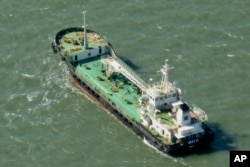Two people in the Somali town of Haabo were wounded Thursday as naval forces traded fire with men trying to ferry supplies to a hijacked oil tanker off the coast.
Witnesses tell VOA's Somali service that the navy of Somalia's Puntland region intercepted a boat it believed was bringing food to gunmen who are holding the Aris 13 and its eight-man Sri Lankan crew.
The exchange of fire Tuesday occurred near the shore and both people wounded were on land.
Earlier, a maritime official said the owners of the hijacked tanker had made contact with the ship and reported the crew members are safe.
“We know from the owners of the ship that they have spoken to the captain and that the crew are all OK and they are safe,” John Steed of the non-profit Oceans Beyond Piracy told VOA. “They are being held under guard in a single compartment in the ship.”
The Sri Lanka-flagged ship is owned by Armi Shipping SA and is operated by Aurora Ship Management, both companies based in the United Arab Emirates.
The Aris 13 was hijacked Monday by gunmen in two skiffs off the coast of Somalia as it traveled from Djibouti to Mogadishu carrying fuel and gas.
The hijackers, who insist they are fishermen, not pirates, say they want "compensation" for illegal fishing off the coast of Somalia but have yet to issue specific ransom demands.
Maritime and Somali regional officials say the hijackers moved the ship to Haabo from its original location off the coast of Alula to the west.
“We don’t have facts but we heard perhaps they moved away from Alula because they received hostile reception from their locals and they felt under pressure to move,” Abdirazak Mohamed Dirir, Puntland counter-piracy director told VOA.
Steed says there is nothing unusual about the move. “Haabo is a bit more difficult to get out and so they may have felt it’s a safer anchorage for them, may be they’ll have a better support where they can get additional guards from," he said.
Officials in Somalia's Puntland region say they have dispatched officials and maritime police to the area to achieve a "peaceful solution."
“We are engaged in an effort to convince these men to free the ship and the sailors without condition and let it continue its journey,” said Dirir.
Dirir says the region wants no ransom paid to the hijackers.
“Paying ransom encourages more hijackings; principally we object to it," he said.
Steed says he is not aware of any ongoing negotiations and suggests a delay may be because there are technical problems.
“It could just be that the pirates have not found their negotiator or translator or don’t know what they want,” he said. “So I would expect over the next couple of days the negotiations to start in earnest.”
Negotiations with pirates aren't always easy. In October of last year, 26 Asian sailors were released after almost five years in Somali pirate captivity.
A group of eight Iranian sailors has been held for more than two years.
Steed, who was involved in the talks that freed the Asian sailors, says the product on the hijacked ship and type of insurance the ship carries influences length of the negotiations.
“Normally where there is a ship with a valuable cargo with a proper insurance the negotiations are a bit swifter,” he said.
Steed says the world cannot afford to see the re-emergence of piracy off the coast of Somalia.
At their height in 2010, bands of Somali pirates hijacked nearly 50 ships and captured more than 1,000 sailors, causing an estimated $7 billion loss to the shipping industry.
Since then, piracy has virtually vanished, as ships adopted better security measures and international navies stepped up their patrols of Somali waters.
Steed says ships near Somalia should follow recommended safety practices, which include avoiding high-risk areas, sailing at high speed, and in some cases carrying armed guards.







